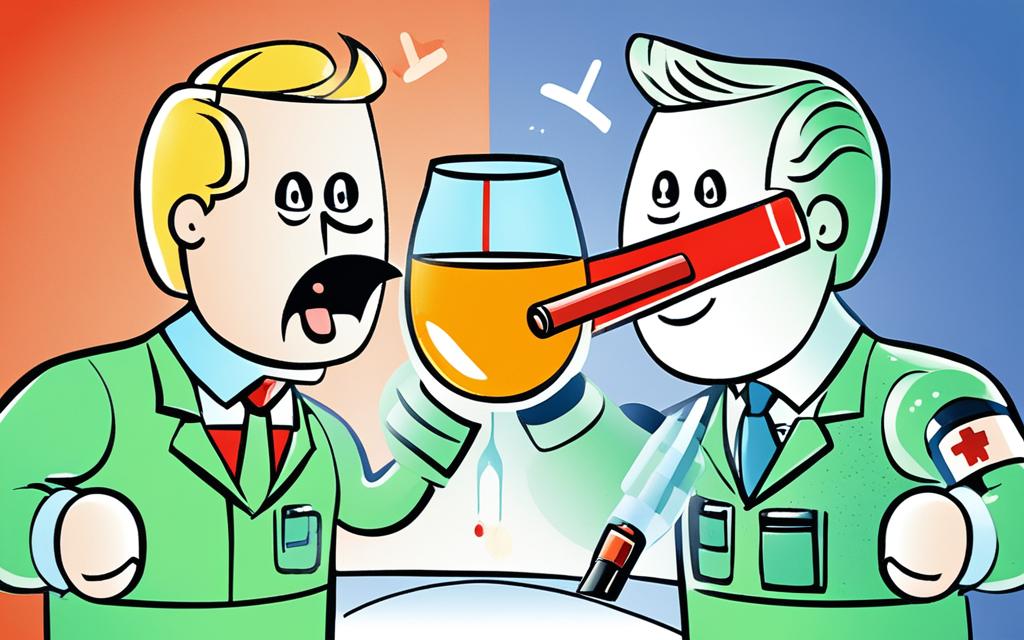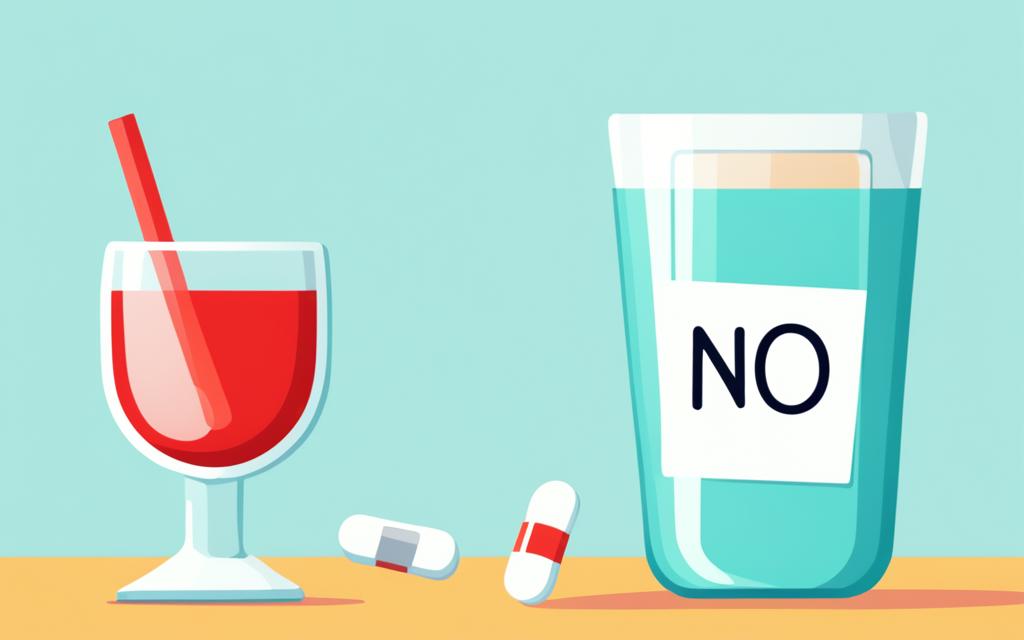In this article, we will discuss the topic of drinking alcohol while taking antibiotics. It is a common question that many people have: should you consume alcohol while on antibiotic medication? Let’s explore the risks and effects of mixing alcohol with antibiotics and understand why it’s generally recommended to avoid alcohol consumption during this period.
Key Takeaways:
- Combining alcohol and antibiotics can have adverse effects on your health.
- Alcohol can interfere with the effectiveness of antibiotics, making them less potent.
- Drinking alcohol while on antibiotics can worsen side effects and prolong recovery time.
- Avoiding alcohol while on antibiotics is important for your overall health and well-being.
- Always consult a healthcare professional or read the medication’s label for specific guidance.
Understanding the Interaction Between Alcohol and Antibiotics
When it comes to combining alcohol and antibiotics, it’s important to understand the potential risks and interactions that can occur. While it may be tempting to indulge in a drink while on antibiotic medication, it’s crucial to consider the impact it could have on your health and the effectiveness of the treatment.
Drinking alcohol while taking antibiotics can lead to adverse effects and potentially worsen your condition. The interaction between alcohol and antibiotic medication can vary depending on the specific type of antibiotic and the individual’s metabolism.
Alcohol can interfere with the way antibiotics are processed in the body, affecting their absorption, metabolism, and elimination. This interaction can lead to several side effects and complications, including:
- Reduced effectiveness of antibiotics: Alcohol can diminish the efficacy of antibiotics, making them less effective in fighting off bacterial infections.
- Increased risk of side effects: Combining alcohol and antibiotics can intensify the side effects associated with both substances, such as dizziness, drowsiness, nausea, and gastrointestinal problems.
- Delayed healing: Alcohol can slow down the healing process by impairing the body’s immune response. This can prolong the duration of your illness or infection.
- Liver toxicity: Both alcohol and certain antibiotics can put a strain on the liver. Combining the two can increase the risk of liver damage or hepatitis.
It’s worth noting that not all antibiotics interact with alcohol in the same way. Certain antibiotics, such as metronidazole and tinidazole, can cause a severe reaction when combined with alcohol. These medications are often used to treat certain infections, including bacterial vaginosis and some types of sexually transmitted infections.
To ensure the safety and effectiveness of your antibiotic treatment, it’s best to avoid alcohol consumption while taking these medications. It’s essential to follow the instructions provided by your healthcare provider and finish the full course of antibiotics as prescribed.
Remember, the priority should always be your health and well-being. If you have any concerns or questions about the interaction between alcohol and your specific antibiotic medication, consult your healthcare provider for personalized advice.

| Antibiotic Medication | Potential Interaction with Alcohol |
|---|---|
| Metronidazole | Severe reaction, including nausea, vomiting, headache, rapid heartbeat, and flushing |
| Tinidazole | Similar severe reaction as metronidazole |
| Fluoroquinolones (e.g., ciprofloxacin, levofloxacin) | Increased risk of side effects, such as drowsiness and dizziness |
| Macrolides (e.g., azithromycin, erythromycin) | Some studies suggest potential increased risk of liver toxicity |
The Importance of Avoiding Alcohol While on Antibiotics
When taking antibiotics, it is crucial to avoid consuming alcohol. While it may be tempting to have a drink, doing so can have serious consequences. Drinking alcohol while on antibiotics can interfere with the effectiveness of the medication and potentially worsen your condition.
One of the main reasons to avoid alcohol while on antibiotics is that it can reduce the medication’s efficacy. Alcohol acts as a strong diuretic, causing increased urine production and faster elimination of antibiotics from the body. This can result in lower antibiotic concentrations in the blood, making it harder for the medication to combat the infection effectively.
Furthermore, drinking alcohol can also amplify the side effects of antibiotics. Both alcohol and certain antibiotics can cause similar side effects such as nausea, vomiting, dizziness, and headaches. When these substances are combined, these side effects can become more severe and uncomfortable, negatively impacting your overall well-being.
Lastly, consuming alcohol can impede the body’s natural healing process. Antibiotics work by targeting and killing bacteria, helping your immune system fight off infection. But when alcohol is introduced into the equation, it can weaken the immune system, making it harder for your body to recover.


